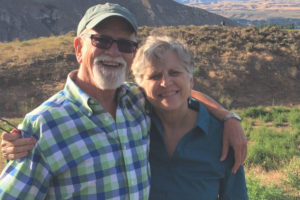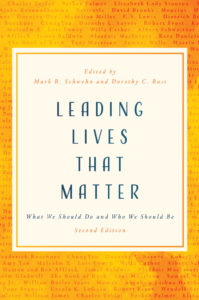Stina Kielsmeier-Cook interviewed Mark and Dorothy about the second edition of their anthology of texts exploring “what we should do and who we should be,” as the subtitle puts it. The original edition was published in 2006. Mark and Dorothy have been resident scholars at the Collegeville Institute several times, and plan to return this fall. Mark R. Schwehn is senior research professor at Christ College, the honors college of Valparaiso University, where he has also served as provost, dean of Christ College, professor of humanities, and founding director of the Lilly Fellows Program. Dorothy C. Bass is a practical theologian and church historian. During twenty-five years as director of the Valparaiso Project on the Education and Formation of People in Faith, she wrote, edited, or coedited more than a dozen books. She is now a senior fellow in the Lilly Fellows Program at Valparaiso University.
 Tell us about this revised edition of your book. You added many new contributors to this anthology over the first edition. What did you change, and why?
Tell us about this revised edition of your book. You added many new contributors to this anthology over the first edition. What did you change, and why?
In the years since the first edition was published, certain questions about meaning and purpose have become more important to us and, we believe, to others. For example: how do communities shape us, our work, and our sense of what matters in life? During a seminar in Collegeville while we were revising the book, Laura Kelly Fanucci pointed out that many of the questions in the first edition were in first person singular, asking, for example, “Must my job be the primary source of my identity?” Laura asked, “Aren’t decisions about the shape of our lives really quite communal?” We agreed! So we added a chapter on community, filling it with texts by such writers as Toni Morrison, Jhumpa Lahiri, Malcolm Gladwell, and Martin Luther King Jr.
Our own powerful awakening to the global environmental crisis resulted in a new chapter titled, “What are my responsibilities to future human and other life?” This is a question everyone needs to ask about life and work in the face of climate change. We hope that this chapter’s texts, which include the work of Denise Levertov, Pope Francis, Rachel Carson, and Natasha Trethewey, as well as creation stories from several religious traditions, will help readers to reflect on this crucial question in deep and fruitful ways. New selections added to older chapters also improved them. For example, Alice Walker’s essay about Zora Neale Hurston adds a brilliant reflection on the importance of having role models to the chapter, “How shall I tell the story of my life?”
It was exciting to read widely in search of texts to build the new chapters and enrich the other chapters, especially by adding a greater diversity of voices and perspectives. Besides, what authors or editors wouldn’t be delighted with the chance at a do-over on a major book? For years we’d been building a file of texts that expand on the first edition—and the revision process allowed us to ask others to make suggestions too. Along the way, we consulted with colleagues across the country.
 How did this book benefit from the time you spent working on it while resident scholars at the Collegeville Institute?
How did this book benefit from the time you spent working on it while resident scholars at the Collegeville Institute?
When our publisher suggested that we create a second edition, our first thought was that we had to do it at Collegeville. Only there, we agreed, would we find the time, space, and collegiality we’d need to get it done. In a way, the book exemplifies the work of the Collegeville Institute, which promotes dialogue among people from different academic disciplines, religions, and ethnicities. Moreover, the substance of the book has been enriched by the kind of collaborative work that happens because of the weekly seminars among resident scholars. Once we had presented our unfolding work, colleagues were constantly suggesting good things they had read that we might include. It was as though we had our own exceptionally gifted research team. For example, a practicing Buddhist monk in the seminar supplied new readings drawn from his own tradition.
Craig Boyd, a resident scholar who came from Saint Louis University for part of the semester, made an especially important contribution. One of the book’s concerns is to understand and assess how people today actually think and talk about what makes a life meaningful and significant. What vocabularies do they use? We sensed that the three vocabularies in the first edition–authenticity, virtue, and vocation–left out an important approach. We were thinking about adding a vocabulary of “heroism,” which people do use a lot these days, but we didn’t like that word or think it quite captured what we were after. When we put the question to the seminar, the conversation spilled over into the evening.
In a way, the book exemplifies the work of the Collegeville Institute, which promotes dialogue among people from different academic disciplines, religions, and ethnicities.
Craig introduced us to recent philosophical work on “exemplarity”–a way of understanding what makes for a worthy life that requires us to think carefully about whom and what we most admire. Three of our favorite new readings are those in which thoughtful authors puzzle through whether they admire specific famous people or not. The novelist Madeline Miller ponders the ambiguous character of Odysseus, who was a trickster as well as a hero and whose reputation has changed many times over the centuries. Dorothy Day explains her changing views of St. Térèse of Lisieux, the “Little Flower,” who at first seemed insipid but whom Day later came to admire as an exemplar of Christian life. And philosopher Gordon Marino reflects on how he sees Muhammad Ali not only as a boxer but also as a brave and generous human being. All three of these texts invite readers themselves to think about the people they do or don’t admire, and why, and how their assessments may have changed over time.
Vocation is one way we talk about work and identity. Tell me more about the other vocabularies you use in the book, and why?
The word “vocation” still has for many an exclusively religious provenance, even though the idea of vocation has gained larger common currency in recent decades. While we think it remains the strongest vocabulary for exploring the junction between work and identity, we have also found that the other three vocabularies enable good and productive thinking that vocation cannot capture by itself. For example, Aristotle, Aquinas, and Rebecca Konyndyk DeYoung articulate their ideas about who the reader might choose to become through “virtue” rather than “vocation.” However, none of those three writers thinks much about work. “Authenticity” and “exemplarity” are important partly because they are so prominent in our society’s conversations about what makes a life worthwhile, even though those conversations are sometimes implicit rather than articulated. We include texts that help readers discern what each vocabulary offers, and then we invite them to clarify their own views. This book aims to prompt discussion.
How do you hope readers will use this book?
The book is ideal for selective study based upon the particular interests and questions of individual readers. After reading the introductory materials and the table of contents, readers could map out for themselves a series of readings that explore their most urgent concerns and confusions. The book is even better for groups, since the readings—which often reflect opposing positions—are arranged to stimulate conversation. The first edition was used widely in first-year seminars that introduce college or university students to major human questions that they are likely to ponder for the rest of their lives. But other groups–families, reading groups, professional reflection groups–could also find much of value here.
We know both younger and older people who found the original edition engaging and stimulating as they pondered crucial issues in their lives, and the new texts and questions should make it even more rewarding. But we also suspect that the book’s content and approach will prove even more urgent and important during the current period of workplace disruption, which is forcing many people to rethink questions of work and identity. A few of the readings focus directly on the concerns of young adults (such as Will Weaver’s short story, “The Undeclared Major”), while others may seem more directed toward older folks (such as an excerpt from Kazuo Ishiguro’s The Remains of the Day). But the great majority of texts speak to readers across the lifespan. A balanced life looks different in college, mid-career, and retirement, to be sure, but people across the lifespan wonder in their own ways about whether balance is possible and preferable to focusing on work, and about how central having a job is to their identity.
[We] suspect that the book’s content and approach will prove even more urgent during the current period of workplace disruption, which is forcing many people to rethink questions of work and identity.
In a sense, the book is a kind of liberal education in one volume, organized around living questions and addressing those questions from works of the human imagination. Someone even called it a reference work of wisdom.
Like this post? Subscribe to have new posts sent to you by email the same day they are posted.



“When we put the question to the seminar …”–the mystery and miracle of the Collegeville Institute in eight words. Books, articles, syllabi, classroom lectures–all of them get transfigured by those conversations that are in equal parts profound and surprising.
Greetings, Patrick. What you say is so true!!!
Mark and I also compiled the original edition of our book while resident scholars in Collegeville. That’s how we knew we’d need to be there again to do the revised edition. The Institute is a remarkable (and to us indispensable) place and community.
Hi, Mark and Dorothy–I’d be equally interested to hear what (if anything) you deleted from the second edition and why!
Hi George! The full table of contents is available at LeadingLivesThatMatter.com. More texts are added than deleted. Some texts that may at first seem to be missing have in fact been moved into other spots. We are pleased with the results, but let us know if you are missing a favorite. We did make a wide survey of what people were actually using, and we kept all of the widely used texts, though somebody’s favorite is probably missing even so.
Hi Dorothy, I could not access the site Leading…com
You may want to check it?
thank you!
Hi Jenni, I’m sorry you’re having trouble accessing the site! Try this URL: http://www.leadinglivesthatmatter.com/